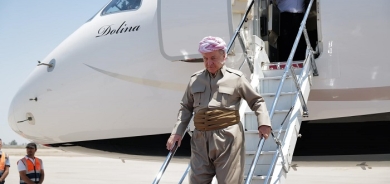EU agrees to slap oil embargo on Iran; U.S. carrier in Gulf after Strait of Hormuz pass

“There is a political agreement on an oil embargo,” said a diplomat who spoke on condition of anonymity after early morning talks between ambassadors of the 27 EU nations. The deal is to be formally approved by EU foreign ministers meeting in Brussels.
Their agreement was the final step before EU foreign ministers can give their formal approval to the measure. The EU’s 27 foreign ministers meet in Brussels on Monday.
“(EU ambassadors) have agreed on Iran sanctions,” the senior EU diplomat said, speaking on condition of anonymity.
Under the deal, EU governments will have to stop signing new contracts with Tehran from the moment the ban comes into place -- probably as soon as this week -- but will be able to fulfill existing contracts until July 1.
The United States, France, Britain and Germany accuse Iran of seeking to build a nuclear bomb, but Tehran says its nuclear drive is peaceful.
U.S. aircraft carrier is now in Gulf
Meanwhile, the U.S. aircraft carrier USS Abraham Lincoln passed through the Strait of Hormuz and is now in the Gulf, the Pentagon said, after Tehran threatened to close the strategic shipping route, while the European Union readied to slap an embargo on Iran’s oil exports Monday.
“USS Abraham Lincoln ... completed a regular and routine transit of the Strait of Hormuz... to conduct maritime security operations as scheduled,” Pentagon spokesman Navy Captain John Kirby said in an email to AFP.
“The transit was completed as previously scheduled and without incident.”
The carrier, which can have up to 80 planes and helicopters on board, was escorted by the guided-missile cruiser USS Cape St George and two destroyers.
Earlier, Britain’s Ministry of Defense said a British Royal Navy frigate and a French vessel had joined the carrier group to sail through the waterway.
While allied ships often participate in U.S. naval exercises and sometimes are part of joint naval flotillas, the presence of British and French ships seemed to be a message to Tehran about the West’s resolve to keep the route open.
“HMS Argyll and a French vessel joined a U.S. carrier group transiting through the Strait of Hormuz, to underline the unwavering international commitment to maintaining rights of passage under international law,” said a spokesman from Britain’s MoD.
He said Britain maintained “a constant presence in the region as part of our enduring contribution to Gulf security.”
Iran’s military and political leaders had warned they could close the strait -- a key transit route for global oil supplies -- if increased Western sanctions over Tehran’s suspect nuclear program halt Iranian oil exports.
The Islamic republic’s navy had also warned it will react if the United States tried to redeploy one of its aircraft carriers to the waterway.
U.S. Defense Secretary Leon Panetta has repeatedly said that closing the strait would cross a “red line.” Two of the 11 U.S. aircraft carriers are currently in the region.
Since then, Iran has tried to ease tensions, with Foreign Minister Ali Akbar Salehi saying last week that Tehran had never tried to close the strait.
“We want peace and stability in the region,” Salehi said.
This is really getting serious
The expected sanctions follow fresh financial measures signed into law by U.S. President Barack Obama on New Year’s Eve, and will mainly target the oil sector, which accounts for some 90 percent of Iranian exports to the EU. Europe is Iran’s second-largest oil customer after China.
“We want them to think ‘This is really getting very, very serious now’,” said one European diplomat, according to Reuters.
Other than the oil embargo, the EU measures are also expected to include sanctions against the Iranian central bank and a ban on trading in gold with the government, diplomats say.
But EU sanctions are likely to take effect slowly. During weeks of negotiations among the EU’s 27 members, Greece and other southern European states pushed hard for a lengthy grace period to limit their own economic costs.
Greece, in particular, is heavily dependent on Iranian oil -- it sources nearly a quarter of its oil imports from Iran -- and has argued that it needs time to find alternative sources.
EU foreign ministers meeting in Brussels will also reassure Athens that it will still be able to buy oil on reasonable terms after the ban goes into effect.
Greece, which relies on financial help from the EU and the International Monetary Fund to stay afloat, now gets Iranian crude on preferential financing terms.
“The financial situation of Greece at the moment is not the brightest one, and rightly they are asking us to help them find a solution,” a senior EU official told reporters on Friday.
With a significant part of EU purchases of Iranian oil covered by long-term contracts, the grace period will be an important factor in the efficiency of EU measures.
The unprecedented effort to take Iran’s 2.6 million barrels of oil per day off international markets has kept global prices high, pushed down Iran’s rial currency and caused a surge in the cost of basic goods for Iranians.
A diplomatic push is underway, officials say, to secure supplies from other producers. Saudi Arabia, the world’s top producer, said this month it would increase production by about 2 million barrels per day.
Meanwhile, global powers involved in negotiations on Iran’s nuclear program are still waiting for a reply to a letter sent to Tehran months ago by EU foreign policy chief Catherine Ashton, her office said Friday.
U.S. Secretary of State Hillary Clinton said Friday that Iran must show a “seriousness and sincerity of purpose” if it is to resume the talks, according to AFP.












